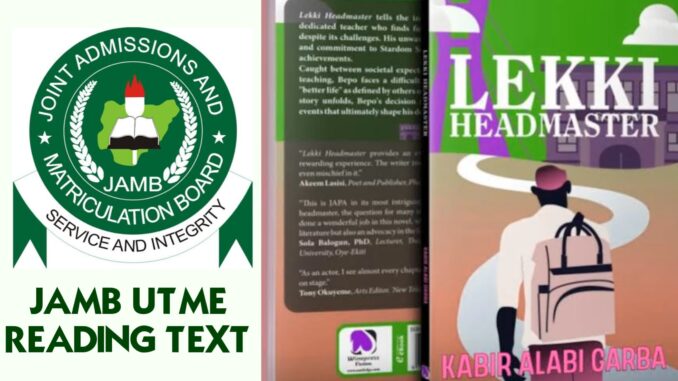JAMB English Note- Clause
Table of Contents
- Definition of a Clause
- Types of Clauses
- Classification of Dependent Clauses
- Clause vs. Phrase
- Examples of Sentences with Clauses
- Common Errors in Clauses
- Class Work
Definition of a Clause
A clause is a group of words containing a subject and a predicate. Clauses form the building blocks of sentences and convey meaning. Depending on their structure and function, clauses can either stand alone as complete sentences or depend on other parts of a sentence for full meaning.
Types of Clauses
1. Independent Clause
An independent clause, also called a main clause, expresses a complete thought. It can stand alone as a sentence.
- Structure: Subject + Predicate (Verb + Object/Complement)
- Examples:
- She loves to read novels.
- They arrived early for the event.
- The dog barked loudly.
- He forgot his homework at home.
- The sun shines brightly in the afternoon.
2. Dependent Clause
A dependent clause, also known as a subordinate clause, does not express a complete thought and cannot stand alone. It depends on an independent clause to make sense.
- Structure: Introduced by a subordinating conjunction or a relative pronoun + Subject + Predicate.
- Examples:
- Although she was tired.
- Because the rain fell heavily.
- Which he found in the drawer.
- While we waited at the bus stop.
- Until the teacher arrived.
Classification of Dependent Clauses
Dependent clauses can be further classified based on their function in a sentence:
A. Noun Clause
A noun clause functions as a noun in the sentence. It can serve as a subject, object, or complement.
- Introducers: “That,” “What,” “Who,” “Whom,” “Why,” “Where,” “Whether,” “How,” etc.
- Examples:
- What she said surprised everyone. (Subject)
- I believe that he will succeed. (Object)
- The issue is why they delayed the project. (Complement)
- We were unaware of who wrote the letter. (Object)
- Whether he will come is uncertain. (Subject)
B. Adjective Clause
An adjective clause, also called a relative clause, modifies a noun or pronoun by providing more information about it.
- Introducers: “Who,” “Whom,” “Whose,” “Which,” “That,” “Where,” “When.”
- Examples:
- The boy who won the prize is my cousin.
- The book that I borrowed is very interesting.
- She met the man whom she admired greatly.
- The house where I was born has been renovated.
- We visited the city which is famous for its culture.
C. Adverb Clause
An adverb clause modifies a verb, adjective, or another adverb by providing information about time, reason, condition, purpose, or manner.
- Introducers: Subordinating conjunctions such as “Because,” “Although,” “If,” “When,” “While,” “As,” “Since,” “Until,” “So that,” etc.
- Examples:
- He left the party because he was tired. (Reason)
- She stayed indoors until the storm was over. (Time)
- We will succeed if we work together. (Condition)
- The children ran home as soon as it started raining. (Time)
- She speaks softly so that everyone can hear clearly. (Purpose)
Clause vs. Phrase
A clause contains both a subject and a predicate, while a phrase lacks either or both.
- Examples of Phrases:
- In the morning (no subject or verb).
- Running quickly (no subject).
- Examples of Clauses:
- She runs quickly (subject + predicate).
- Because he was late (subject + predicate).
Examples of Sentences with Clauses
- Independent Clause:
- She enjoys reading books.
- The car stopped suddenly.
- Dependent Noun Clause:
- I understand why she left the room.
- We do not know what caused the delay.
- Dependent Adjective Clause:
- The man who lives next door is friendly.
- The dog that barked all night belongs to Mr. Jones.
- Dependent Adverb Clause:
- He came home early because he was not feeling well.
- They will stay outside until the rain stops.
Common Errors in Clauses
- Run-on Sentences:
Occur when two independent clauses are joined without proper punctuation.- Incorrect: She is tired she is going to bed.
- Correct: She is tired, so she is going to bed.
- Fragmented Sentences:
Occur when a dependent clause is written as a complete sentence.- Incorrect: While the rain poured.
- Correct: While the rain poured, we stayed indoors.
Class Work
- Identify the type of clause in the sentence below:
“The girl who won the race is my sister.”
- Choose the correct clause type in this sentence:
“I went home because I was feeling tired.”
A. Noun Clause
B. Adjective Clause
C. Adverb Clause
D. Independent Clause
- Identify the main clause in this sentence:
“Although it was raining, we decided to play football.”
- Complete the sentence with a suitable dependent clause:
“She will not leave the house until __.”
- Choose the correct option to complete the sentence:
“The man __ lives next door is a doctor.”
A. who
B. which
C. when
D. that
- Select the correct option to identify the function of the underlined clause:
“I understand that he needs help.”
A. Adjective Clause
B. Noun Clause
C. Adverb Clause
D. Independent Clause





